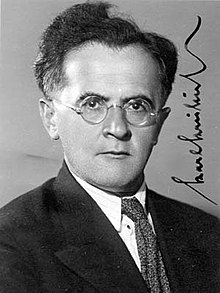Karl Kreibich (politician)
Karl Kreibich (born February 14, 1883 in Zwickau , Bohemia , † August 2, 1966 in Prague ) was a Czechoslovak politician , editor, journalist, writer and diplomat of German descent. He held numerous political offices in Czechoslovakia and was a co-founder of the Communist Party of Czechoslovakia .
Life
Karl Kreibich was born as the son of a German-Bohemian working - class family who were active in social democracy in the small industrial town of Zwickau, near the German border. However, since 1897 he learned the Czech language regularly . The young Kreibich was initially a supporter of right-wing ideology, from which he broke away early on and joined the labor movement. During the First World War he made it to the position of lieutenant colonel of the imperial and royal Austrian monarchy. After training at a business school in 1902, he first joined the left wing of the SPÖ , the Social Democratic Party of Austria. In Reichenberg he was also the editor of the Austrian version of the party magazine " Vorwärts ". There he got to know the politician Josef Strasser , who became his teacher in Marxist ideology. In 1918 he became leader of the Czechoslovak section of the SPD . In 1921 he was a co-founder of the Communist Party of Czechoslovakia (KSČ). Kreibich was a member of the Executive Committee of the Communist International in 1921 and 1922. As a member of his party in the Czechoslovak Parliament from 1920 to 1929 and as a senator from 1935 to 1938. Edvard Beneš appointed him from 1941 to 1945 a member of the State Council of the Czechoslovak government in exile in London . In 1945 he returned to Czechoslovakia. From 1950 to 1952 he was the ambassador of the ČSR in Moscow .
Kreibich mentally fought against Sudetism, as he saw it pose a threat to the Czechoslovak state. He also wrote that the problem with the Germans had not only existed since Hitler and Konrad Henlein , but had been a problem for the Bohemian and Czech population for centuries before that. He pleaded for all Germans to be banned from Czechoslovakia without exception, even if innocent people were affected, in his opinion the Germans would also have murdered thousands of innocent Czechs.
His daughter Ilse Kreibich was married to the politician Jaromír Dolanský , who had been Czechoslovak finance minister for two years. Most of Kreibich's legacy has not been scientifically researched in archives in Prague. His autobiography, based on the years up to 1921, appeared posthumously in 1968. Kreibich saw himself as a citizen of the world .
Works (selection)
- The national question: Comrade Karl Kreibich's report, the resolution and the appeal to the proletariat of non-German nations, 1921, polemic.
- The people's business is not Henlein's business, non-fiction book, 1937.
- The Germans and the Bohemian Revolution 1848, non-fiction book, 1952.
- Těsný domov - širý svět (Narrow Homeland - Wide World), autobiography, 1968 (posthumous).
swell
- Philipp Eichhoff: ″ You will not understand it ″ in Konkret , issue 11/2012, pages 26f.
- ″ Kremlin Power Words in German ″ in Der Spiegel on May 12, 1949
| personal data | |
|---|---|
| SURNAME | Kreibich, Karl |
| BRIEF DESCRIPTION | Czech politician, editor, journalist, writer, diplomat |
| DATE OF BIRTH | February 14, 1883 |
| PLACE OF BIRTH | Cvikov |
| DATE OF DEATH | 2nd August 1966 |
| Place of death | Prague |
